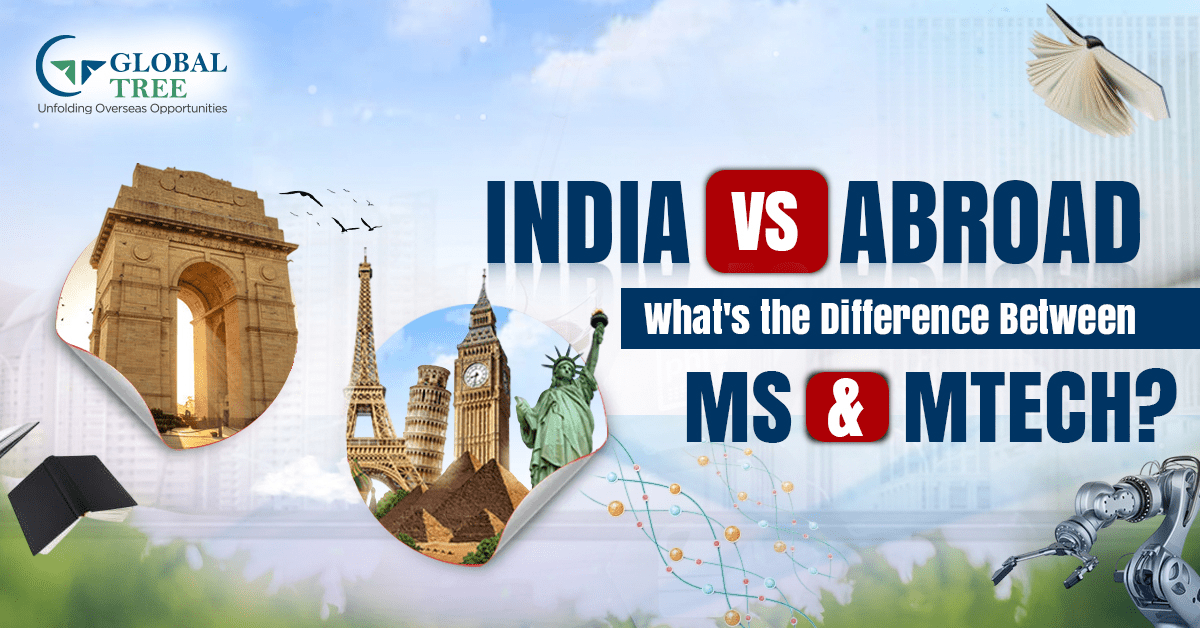USA F1 Visa Vs J1 Visa: Everything you need to know about your American Dream

Introduction
Picture a land where dreams are made real, a realm known across the globe as the 'land of opportunities.' This magical place is none other than The United States of America. With its hallowed halls of learning, a cultural tapestry woven from threads of diversity, and a bounty of career pathways, the USA beckons to dreamers and achievers alike.
For those who yearn to seize these opportunities, international students and exchange visitors have two visas as their enchanted keys: The F1 visa and the J1 visa.
In this immersive article guide, we'll embark on a journey through the intricate realms of these visas, arming you with the wisdom to chart your course toward the American dream.
F1 Visa: A Gateway to Academic Excellence
Let us delve deeper into understanding about the F1 Visa and find out if that is what you need.
Understanding the F1 Visa
The F1 visa is a non-immigrant visa designed specifically for international students who aspire to pursue academic programs in the United States. This is why you need to comprehend all the requirements to study in the USA before you get your visa and these decisions are to be made beforehand.
Furthermore, if you are an Indian student looking to study in the USA after 12, the USA can be your dream destination for advancing your career.
This visa category is the preferred choice for those looking to enroll in U.S. colleges, universities, language schools, or other accredited educational institutions.
The F1 visa permits students to engage in full-time academic study and, under certain conditions, practical training relevant to their chosen field of study.
However, to help you more with your F1 visa you can check out the USA application process and tips.
Key Features of an F1 Visa:
- Academic Pursuits: The primary purpose of the F1 visa is to enable individuals to enroll in degree programs, diplomas, certificates, or other recognized educational courses.
- Duration: F1 visas are typically granted for the time of the academic program, with an optional practical training period upon completion of studies.
- Work Opportunities: F1 students can engage in on-campus employment and, under specific circumstances, off-campus employment, although employment options may be limited during the first year.
- Dependents: Spouses and unmarried children under the age of 21 of F1 visa holders are eligible for F2 visas, which allow them to accompany the primary visa holder but do not grant work authorization.
- Intent: F1 visa holders are expected to maintain non-immigrant intent, indicating their intention to return to their home country upon completing their educational pursuits.
Also, check out all about the F1 visa interview beforehand to ensure about the questions asked during your interview.
Advantages of an F1 Visa:
- Access to world-renowned U.S. educational institutions.
- Opportunities for Optional Practical Training (OPT) post-graduation, providing valuable work experience.
- Flexibility to transfer between schools or programs.
- Provision for spouses and children to accompany the F1 visa holder.
[You may also want to read: F1 visa students can Work off-campus under the OPT program]
Terms and Validity of an F-1 visa
F-1 visas typically have a validity period of five years.
Nevertheless, it's important to note that your visa's duration is directly tied to the length of your educational program or language course, as indicated in your I-20 form. When your academic or language studies come to an end, your F-1 visa status will also cease.
In certain situations, such as unexpected delays due to illness or a change of academic major, if it becomes apparent that you won't be able to complete your studies within the initially specified timeframe, you may be eligible to request an extension of your F-1 visa.
This extension allows you to maintain your legal status in the United States while you continue and complete your educational pursuits.
[Read more: Eligibility requirements to study in the USA universities]
Costs for an F-1 visa
The cost of an F-1 visa to study in the USA consists of consular fees and the so-called SEVIS fee.
| F1 VISA FEE | AMOUNT (approx.) |
|---|---|
|
Nonimmigrant visa processing fee |
$ 185 |
|
SEVIS fee |
$ 350 |
J1 Visa: A Window to Cultural Exchange and Beyond
Let us delve deeper into understanding the J1 Visa and find out if this Visa is the one that will help you pursue your American dream.
Understanding the J1 Visa
The J1 visa is a versatile category designed for individuals participating in approved exchange visitor programs in the United States. If you are one of them, then it is important to understand how to get a USA student visa in depth.
These programs aim to foster cultural exchange and international collaboration, encompassing a wide spectrum of activities including studying, conducting research, teaching, and training.
Key Features of a J1 Visa:
- Diverse Programs: The J1 visa category encompasses a multitude of program types, including au pairs, interns, scholars, teachers, and more.
- Duration: The duration of a J1 visa hinges on the specific program and can range from a few weeks to several years.
- Work Opportunities: J1 visa holders may have limited work options, typically related to their program, subject to approval by their program sponsor.
- Dependents: Certain J1 program categories permit dependents to accompany the primary J1 visa holder, often on J2 visas. J2 visa holders may also be eligible for work authorization under certain conditions.
- Intent: J1 visa holders are generally required to return to their home country for a minimum of two years after completing their program before being eligible for specific U.S. visas, fostering the exchange aspect of the visa.
[You may also want to read: Plan your master's program in the USA]
Advantages of a J1 Visa:
- Exposure to diverse cultural experiences and interactions.
- Opportunities to gain practical experience and training in various fields.
- Potential for family members to join and engage in work within the U.S. (dependent on the program category).
[You may also want to read: How to Migrate to USA from India?]
Duration and validity of a J1 visa
The J-1 visa's validity period varies depending on the specific program, typically spanning between 12 to 24 months on average.
Your J-1 visa's duration is closely tied to the length of your internship, employment, or cultural exchange experience.
In the event that unforeseen delays, such as unexpected circumstances or program alterations, prevent you from completing your internship, school year, or job within the initially designated timeframe, you have the option to seek an extension of your J1 visa.
This extension enables you to maintain your legal status in the United States while you continue and conclude your program or work commitments.
[You may also want to read: Top 5 mistakes to avoid when studying in the USA!]
Cost of a J1 Visa
The expenses associated with obtaining a J-1 visa for internships, au pair positions, high school programs, summer jobs, or traineeships encompass consular fees as well as the SEVIS fee.
The exact amount of the SEVIS fee varies based on the specific purpose:
| F1 VISA FEE | AMOUNT (approx.) |
|---|---|
|
Nonimmigrant visa processing fee |
$ 185 |
|
SEVIS fee for au pair and summer jobs |
$ 35 |
|
SEVIS fee for all other J-1 types |
$ 220 |
[You may also want to read: Top reasons for USA visa rejection]
USA F1 Visa Vs J1 Visa: USA Visa Comparison
The decision to study in the United States is a pivotal moment in any international student's life. Among the multitude of considerations, one of the most critical choices is selecting the right visa type.
Understanding which visa is right for you isn't enough. You also need to take care of the cost of living in the States. Especially, if you are an Indian student and going to the USA for the first time.
However, here is a comparison table to help you differentiate what is best for you.
| Aspect | F1 Visa | J1 Visa |
|---|---|---|
|
Visa Type |
Student Visa |
Exchange Visitor Visa |
|
Purpose |
For full-time academic study in the U.S. |
For educational and cultural exchange programs |
|
Eligibility |
Typically degree-seeking students |
For participants in approved exchange programs |
|
Work Authorization |
Limited to on-campus work during the academic year |
Possible off-campus work through Optional Practical Training (OPT) and Curricular Practical Training (CPT) |
|
Duration |
Duration of status, including the program duration |
Duration varies based on the exchange program, with possible extensions in some cases |
|
Sponsorship |
Typically sponsored by a U.S. educational institution |
Sponsored by U.S. Department of State-designated programs |
|
SEVIS Requirement |
Yes (Student and Exchange Visitor Information System) |
Yes (Student and Exchange Visitor Information System) |
|
Dependents |
Eligible dependents (spouse and children) can apply for F2 visas |
Eligible dependents (spouse and children) can apply for J2 visas |
|
Two-Year Home Residency Requirement |
Generally, no such requirement |
Some J1 visa holders may be subject to a two-year home residency requirement depending on their program and country of origin |
|
Cultural Exchange Component |
Primarily focused on academic coursework and research |
Emphasizes cultural exchange through various programs and activities |
Making the Right Choice: F1 visa vs J1 visa
Choosing between the F1 and J1 visa depends on your academic and career goals. Here are some key considerations to help you make the right choice:
- Work Opportunities: Consider your desire for internships and post-graduation employment. The F1 visa provides more flexibility in this regard, making it appealing for students looking to gain work experience in the U.S.
- Cultural Exchange: If you seek a comprehensive cultural exchange experience, or plan to engage in non-degree programs, research, or training, the J1 visa may be more suited to your needs.
- Family Considerations: If you intend to bring your spouse or dependents with you and potentially have them work in the U.S., the J1 visa may be a more favorable option.
- Home Country Commitment: Be mindful of the home residency requirement associated with certain J1 program categories, which mandates returning to your home country for a specified period before pursuing other U.S. visas.
- Program Type: Determine if your academic program falls under the F1 or J1 category. If you're pursuing a traditional degree, the F1 visa is likely the better fit. If you're engaging in a short-term exchange program, the J1 visa may be more suitable.
- Future Plans: Think about your long-term goals. If you intend to pursue a career or further studies in the United States, the F1 visa, with its post-graduation employment options and potential for extensions, may be more advantageous.
Choosing between the USA F1 vs J1 visa involves careful consideration of your academic objectives, program type, and future plans.
Understanding the distinctions between these visas is essential for making the right choice and ensuring a successful academic journey in the United States.
[You may also want to read: List of Top Rated USA Universities & Colleges]
Conclusion
Both the F1 visa and the J1 visa offer unique avenues for international students and exchange visitors to fulfill their American dreams. It is imperative to meticulously assess your goals, program requisites, and long-term plans before committing to a specific visa type.
Regardless of the path you choose, the United States presents an abundance of opportunities for personal and professional growth, making your American dream an attainable reality.
Embrace the journey, explore the possibilities, and take the first step toward realizing your aspirations in the land of opportunities.
FAQs
-
What is the main difference between the F1 visa and J1 visa for the USA?
- The primary difference is the purpose of your stay. F1 is for academic study, while J1 is for exchange programs, including study, research, and cultural exchange.
-
Can my spouse and children join me on either visa type?
- Spouses and dependent children can often accompany F1 and J1 visa holders but must apply for the appropriate dependent visas (F2 or J2).
-
Are there any home country residency requirements after completing my program on a J1 visa?
- Some J1 visa categories may have a home country residency requirement, meaning you must return to your home country for a specific period before changing to certain other visa statuses. Check your J1 program's details for this requirement.
-
What happens if I want to change my visa type while in the USA?
- Changing your visa status while in the USA can be complex. Consult with an immigration attorney or your international student office for guidance specific to your situation.
-
Can I apply for a Green Card (permanent residency) on an F1 or J1 visa?
- Both F1 and J1 visa holders may eventually apply for a Green Card, but the process and eligibility criteria can be different. Consult with an immigration attorney for personalized advice.
-
Can I extend my stay on either visa type if my circumstances change?
- Extensions are possible for both F1 and J1 visas under certain conditions. Consult with your DSO (F1) or Responsible Officer (RO) (J1) for guidance and eligibility requirements.









